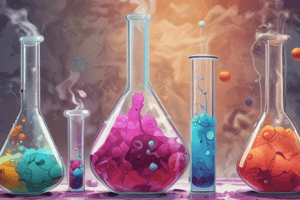Podcast
Questions and Answers
What type of reaction involves the transfer of electrons?
What type of reaction involves the transfer of electrons?
- Oxidation-Reduction (Redox) Reaction (correct)
- Decomposition Reaction
- Combination Reaction
- Displacement Reaction
What is the purpose of a catalyst in a chemical reaction?
What is the purpose of a catalyst in a chemical reaction?
- To increase the concentration of reactants
- To speed up a reaction without being consumed (correct)
- To decrease the temperature of a reaction
- To decrease the surface area of reactants
Which of the following reactions is an example of an exothermic reaction?
Which of the following reactions is an example of an exothermic reaction?
- CaCO3 + Heat → CaO + CO2
- 2H2 + O2 → 2H2O
- 2CuO + H2 → Cu + H2O
- CaO + H2O → Ca(OH)2 + Heat (correct)
What is the effect of increasing the temperature of a chemical reaction?
What is the effect of increasing the temperature of a chemical reaction?
What is an oxidizing agent in a redox reaction?
What is an oxidizing agent in a redox reaction?
Which of the following reactions is an example of a decomposition reaction?
Which of the following reactions is an example of a decomposition reaction?
Flashcards are hidden until you start studying
Study Notes
Chemical Reactions
Chemical Equation
- A chemical equation is a symbolic representation of a chemical reaction
- It uses chemical formulas of reactants and products to represent the reaction
- Reactants are written on the left, and products are written on the right, separated by an arrow (→)
Types of Chemical Reactions
- Combination Reaction: two or more substances combine to form a new compound
- Example: 2H2 + O2 → 2H2O
- Decomposition Reaction: a single compound breaks down into two or more substances
- Example: 2H2O → 2H2 + O2
- Displacement Reaction: one element displaces another element from a compound
- Example: Zn + CuSO4 → ZnSO4 + Cu
- Oxidation-Reduction (Redox) Reaction: involves the transfer of electrons
- Example: 2CuO + H2 → Cu + H2O
Oxidation and Reduction
- Oxidation: a substance loses one or more electrons
- Reduction: a substance gains one or more electrons
- Oxidizing Agent: a substance that causes oxidation (gains electrons)
- Reducing Agent: a substance that causes reduction (loses electrons)
Exothermic and Endothermic Reactions
- Exothermic Reaction: a reaction that releases heat energy
- Example: CaO + H2O → Ca(OH)2 + Heat
- Endothermic Reaction: a reaction that absorbs heat energy
- Example: CaCO3 + Heat → CaO + CO2
Factors Affecting Chemical Reactions
- Temperature: increased temperature can increase reaction rate
- Concentration: increased concentration of reactants can increase reaction rate
- Surface Area: increased surface area of reactants can increase reaction rate
- Catalyst: a substance that speeds up a reaction without being consumed
Studying That Suits You
Use AI to generate personalized quizzes and flashcards to suit your learning preferences.




